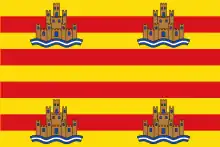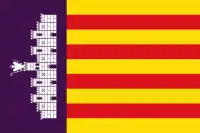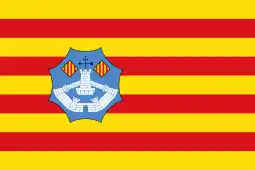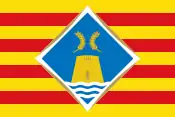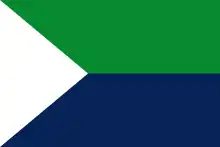List of Spanish flags
This is a list of Spanish flags, with illustrations.
Wikimedia Commons has media related to Flags of Spain.
National flags
| Flag | Date | Use | Description |
|---|---|---|---|
 |
1981–present | National Flag with coat of arms, State flag, State ensign, and War ensign | National flag with coat of arms |
.svg.png.webp) |
1843–1931 1939–present Civil ensign for use in merchant ships 1 January 1928 to present |
Civil flag and ensign | The flag of Spain consists of three horizontal stripes: red, yellow and red, the yellow strip being twice as wide as each red stripe. |
 |
1939–present | Naval jack | A squared flag divided into four squares representing the four Kingdoms of Spain with navies in the Middle Ages: Castile (represented by a castle, top left), Leon (represented by a heraldic lion, top right), Aragon (represented by four pallets, bottom left), and Navarre (represented by an orle of chains, bottom right) |
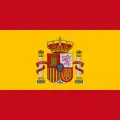 |
1982–present | High Civil Authorities' flag | A square flag of Spain with the Spanish coat of arms on the center |
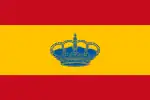 |
1977–present | Yacht ensign | The flag of Spain with a blue plain Royal Crown in the center |
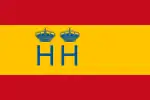 |
1977–present | Customs Service ensign | The flag of Spain with two crowned "H" |
Royal standards
| Flag | Date | Use | Description |
|---|---|---|---|
 |
2014–present | Standard of the King of Spain | A crimson square with the Coat of arms of the King in the center. A version of the flag with gold fringing is known as the guidon and serves as the command sign or positional flag for military use. |
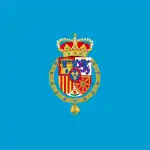 |
2015–present | Standard of the Princess of Asturias | A light blue square with the Coat of arms of the Princess in the center. A version of the flag with gold fringing is known as the guidon and serves as the command sign or positional flag for military use. |
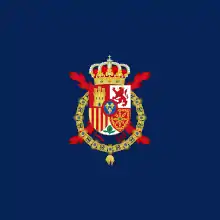 |
1975/ 1977–present (Legal regulation)[1] |
Standard of King Juan Carlos | A dark blue square with the Coat of arms of King Juan Carlos in the center. A version of the flag with gold fringing is known as the guidon and serves as the command sign or positional flag for military use. |
Regional flags
| Flag | Date | Use | Description |
|---|---|---|---|
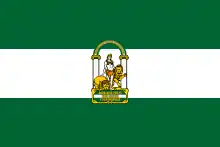 |
Flag of Andalusia (the Arbonaida) | Three equal horizontal bands of green (top), white and green, there is an Andalucian coat of arms in center of the white band. | |
 |
Flag of Aragon | Nine equal horizontal stripes of yellow (top, double width) and red, there is an Aragon coat of arms in left the red and yellow bands, the coat of arms featured a gold crown have four green small diamonds and three red small disk, the shield means four corner, first corner means (yellow field with a red cross in upper tree), second corner means (violet field with white cross in hoist-side left corner, third corner means (red St. George and St. Andrew cross have four corners have four man heads) and fourth corner means (nine equal vertical bands of yellow (top, double width) and red). | |
 |
Flag of Asturias | Blue field with the Victory Cross in center, hanging from the horizontal axis on either side of the cross are an upper-case Greek letter Alpha (Α) on the left and a lower-case Omega (ω) on the right. | |
 |
Flag of the Balearic Islands | Nine equal horizontal stripes of yellow (top, double width), and red, and a Balearic castle in purple hoist-side upper left corner. | |
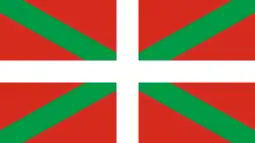 |
Flag of the Basque Country (the Ikurriña) | The red ground symbolizes Biscayan people (the race); the green saltire represents the Oak of Guernica, a symbol of the old Basque laws, or Fueros; and the white cross over them as a symbol of Basque Catholic devotion. | |
 |
Flag of the Canary Islands | Three equal vertical bands of white (top), blue, and yellow, there is a Canary Island coat of arms in center the blue band, the coat of arms featured the word motto "OCEANO" in silver ribbon in upper, royal crown in middle and two dogs are holding the shield in lower, the shield have seven hillocks. | |
 |
Flag of Cantabria | Two horizontal stripes of equal width, white on the top and red on the bottom, and the region's coat of arms in its centre. The first field of the coat of arms represents the conquest of Seville by Cantabrian marines in 1248 (with the ship breaking the chains that blocked the way through the river Guadalquivir), while the second field honors the pre-Roman Cantabri people showing geometric ornaments typically found on Cantabrian stelae.[2] | |
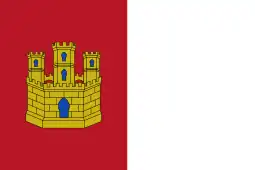 |
Flag of Castilla-La Mancha | ||
 |
Flag of Castile and León | Two Lions from the Kingdom of León and two castles from Kingdom of Castille. | |
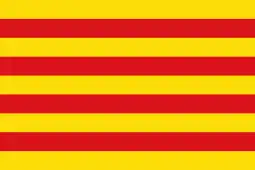 |
Flag of Catalonia (the Senyera) | ||
 |
Flag of Ceuta | ||
.svg.png.webp) |
Flag of Extremadura | ||
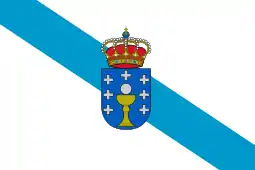 |
Flag of Galicia | ||
.svg.png.webp) |
Flag of La Rioja | ||
 |
Flag of Madrid | A crimson red field representing Castille, with seven five-pointed stars in silver (placed four and three in the centre) representing the administrative areas of the region.[3] | |
 |
Flag of Melilla | ||
 |
Flag of Murcia | ||
 |
Flag of Navarre | Against a red background, the coat of arms of Navarre, which consists of a pattern of golden chains, with eight of them linked with an emerald in the center (based of the banner of the Ancient Kingdom of Navarre) | |
.svg.png.webp) |
Flag of the Valencian Community (the Reial Senyera) | A derivation of the traditional Senyera of the Crown of Aragon, it is composed of four red bars on a yellow background, crowned with a blue strip party per pale next to the hoist. |
Provincial flags
The provinces of A Coruña, Alicante, Castellón, Valencia and Zamora do not have a flag.
Islands
Municipal flags
Historical flags
Kingdom of Asturias
| Flag | Date | Use | Description |
|---|---|---|---|
 |
842-850 | Royal Standard of Ramiro I of Asturias |
Kingdom of Castile
| Flag | Date | Use | Description |
|---|---|---|---|
 |
1175-1214 | Royal Standard of the Kingdom of Castile | |
.svg.png.webp) |
1214-1230 | Royal Standard of the Kingdom of Castile |
Kingdom of León
| Flag | Date | Use | Description |
|---|---|---|---|
| 1105-1157 | Royal Flag of Alfonso VII of León and Castile | ||
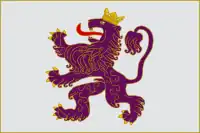 |
1157-1230 | Royal Flag of The Kingdom of Leon |
Kingdom of Galicia
| Flag | Date | Use | Description |
|---|---|---|---|
 |
Unknown; recreation. Original flag documented in 1669, discovered circa. 1927.[4] | Modern recreation of the royal standard of the Suebi Kingdom of Galicia | |
 |
circa. 1282 | Flag of the Kingdom of Galicia | |
 |
16th century | Flag of the Kingdom of Galicia |
Granada
| Flag | Date | Use | Description |
|---|---|---|---|
| 1230-1492 | Flag of The Emirate of Granada | ||
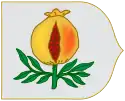 |
1492-1833 | Flag of The Kingdom of Granada |
Kingdom of Toledo
| Flag | Date | Use | Description |
|---|---|---|---|
 |
1085-1833 | Banner of The Kingdom of Toledo |
Kingdom of Murcia
| Flag | Date | Use | Description |
|---|---|---|---|
 |
1266 | 1st Standard of the Kingdom of Murcia | |
.svg.png.webp) |
1266-1361 | 2nd Standard of the Kingdom of Murcia | |
.svg.png.webp) |
1361 | 3rd Standard of the Kingdom of Murcia | |
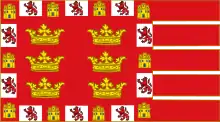 |
1361-1575 | Final Standard of the Kingdom of Murcia |
Kingdom of Navarre
| Flag | Date | Use | Description |
|---|---|---|---|
 |
1194-1234 | Royal Flag of Sancho VII of Navarre | |
.svg.png.webp) |
1212-1589 | Royal Standard of the Kings of Navarre | |
 |
1589-1841 | Royal Standard of the Kings of Navarre |
Crown of Castile
| Flag | Date | Use | Description |
|---|---|---|---|
.svg.png.webp) |
1230-1406 | Royal Standard of the Crown of Castile | |
.svg.png.webp) |
1406-1500 | Royal Standard of the Crown of Castile | |
-Variant.svg.png.webp) |
1406-1500 | Royal Standard of the Crown of Castile (Square Shape) | |
.svg.png.webp) |
1500-1715 | Royal Standard of the Crown of Castile |
Crown of Aragon
| Flag | Date | Use | Description |
|---|---|---|---|
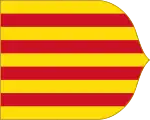 |
1162–1716 | Royal Standard of the Crown of Aragon | |
 |
1238-1276 | The Pennon of the Conquest of Valencia. |
Flags
See also: Flag of Spain
| Flag | Date | Use | Description |
|---|---|---|---|
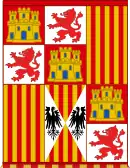 |
1475–1504 Eventually until 1506 |
Flag of the infantry forces | |
 |
1506–1842 | Cross of Burgundy flag, military flag, also used as flag of the Spanish Empire and its overseas territories | A red saltire resembling two crossed, roughly-pruned (knotted) branches, on a white field |
 |
1506–1762 | Merchant marine's flag | |
 |
1701–1771 | Flag used in naval bases and coast defenses | |
 |
1701–1785 | Naval ensign | |
.svg.png.webp) |
1701–1760 | Etiquette's Naval ensign | |
.svg.png.webp) |
1760–1785 | Etiquette's Naval ensign | |
 |
1808–1813 | Flag of Spain under Joseph Bonaparte (1808–1813) | |
 |
1785–1927 | Merchant marine's flag (1785–1927) | |
.svg.png.webp) |
1785–1873 / 1875–1931 | War ensign (1785–1843). State flag (1843–1873 and 1874–1931) | |
 |
1873–1874 | Flag of the First Spanish Republic | |
(3-5)_v2.svg.png.webp) |
1931–1939 | Flag of the Second Spanish Republic | |
.svg.png.webp) |
1931–1939 | Civil flag and ensign of the Second Spanish Republic | |
 |
1936–1938 | Flag of Spain (Nationalist faction) | |
.svg.png.webp) |
1938–1945 | Flag of Spain (Spain under Franco's Rule until his death in 1975, and the transition back to democracy under the monarchy) | |
.svg.png.webp) |
1945–1977 | ||
.svg.png.webp) |
1977–1981 |
Historical royal standards
Royal banners of arms
| Flag | Date | Use | Description |
|---|---|---|---|
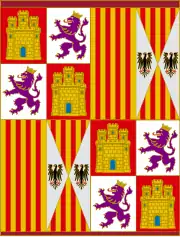  |
1475–1492 1492–1504 |
Banner of arms of the Catholic Monarchs | |
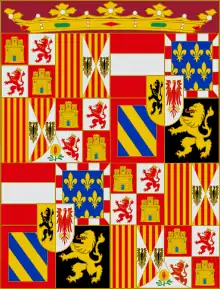 |
1518–1556 | Banner of arms of King Charles I | |
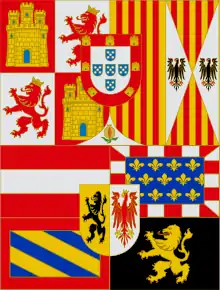 |
1580–1668 | Banner of arms of the House of Austria (with the arms of Portugal) |
|
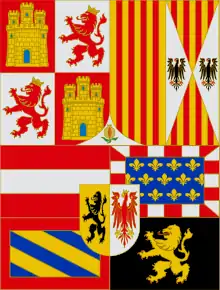 |
1668–1700 | Banner of arms of the House of Austria (from 1668) |
|
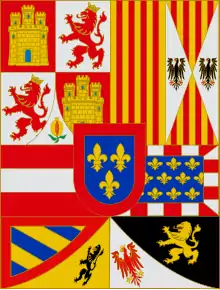 |
1700–1761 | Banner of arms of the House of Bourbon | |
.svg.png.webp) |
1761–1868 1875–1931 |
Banner of arms of the House of Bourbon | |
.svg.png.webp) |
1931 | Banner of arms of King Alfonso XIII |
Royal standards (common use)
| Flag | Date | Use | Description |
|---|---|---|---|
 |
1475–1492 | Common Royal Banner of the Catholic Monarchs (Until 1492) |
|
.svg.png.webp) |
1475–1492 | Royal Standard or Royal Flag of the Catholic Monarchs | |
.svg.png.webp) |
1492–1508 | Royal Standard or Royal Flag of the Catholic Monarchs | |
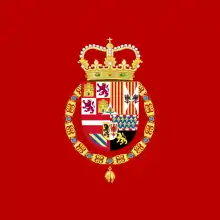 |
1556–1580 1668–1700 |
Royal Standard or Royal Flag of the House of Habsburg. | |
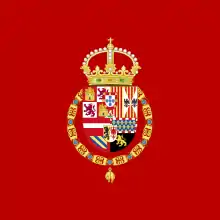 |
1580–1668 | Royal Standard or Royal Flag of the House of Habsburg. (Inescutcheon of Portugal in the Royal arms) |
|
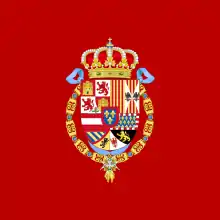 |
1700–1761 | Royal Standard or Royal Flag of the House of Bourbon. The banner includes the collar of the Spanish Order of the Golden Fleece and the blue ribbon of the Bourbon French Order of the Holy Spirit. | |
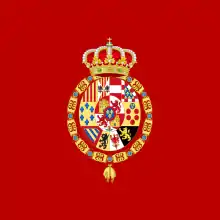 |
1761–1838 | Royal Standard or Royal Flag of the House of Bourbon. | |
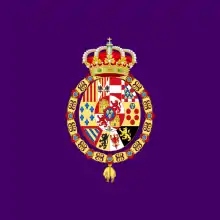 |
1838–1868 1875–1931 |
Royal Standard or Royal Flag of the House of Bourbon. | |
 |
1975/ 1977–2014 (Legal regulation)[5] |
Royal Standard or Royal Flag of King Juan Carlos I | Still in use as King Juan Carlos' personal ensign. |
 |
2014 - In use/ |
Royal Standard or Royal Flag of King Felipe VI | Still in use as King Felipe's personal ensign. |
Royal Guidons
| Flag | Date | Use | Description |
|---|---|---|---|
.svg.png.webp) .svg.png.webp) |
c.1475–1508 | Castilian Guidon of the Catholic Monarch | |
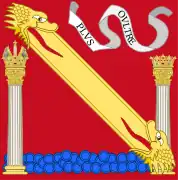 |
c.1518–1556 | Castilian Guidon of Charles I | |
 |
c.1580–1598 | Royal Guidon of Philip II | |
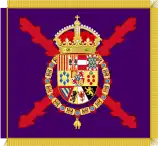 |
c.1920–1931 | Royal Guidon of Alfonso XIII. |
Standards of heads of state
| Flag | Date | Use | Description |
|---|---|---|---|
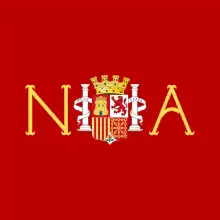 |
1931–1936 | Presidential standard of Niceto Alcala Zamora | |
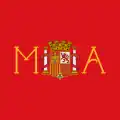 |
1936–1939 | Presidential standard of Manuel Azaña | |
.svg.png.webp) |
1940–1975 | Standard of Francisco Franco. |
Members of the royal family
| Flag | Date | Use | Description |
|---|---|---|---|
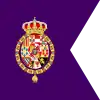 |
1893–1931 | Standard or Flag of Spanish Infantes | A purple swallowtail flag with the royal arms in the center. |
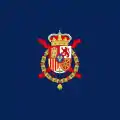 |
1971–1975 | Standard of Juan Carlos, Prince of Spain | A dark blue square with the Coat of arms of Juan Carlos as Prince in the center. |
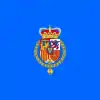 |
2001–2014 | Standard of Felipe, Prince of Asturias | A light blue square with the Coat of arms of the Prince in the center. |
See also
References
- Royal Decree 527/2014 an amendment to Title I of Spanish Royal Decree 1511/1977 Flags, standards, guindons and insignia regulation.
- Symbols of Cantabria Archived 2006-06-14 at the Wayback Machine Web site of the Cantabrian Parliament
- Law 2/1983, of 23 december of the Community of Madrid
- Royal Standard of the Swabian Kings of Gallaecia
- Royal Decree 527/2014 an amendment to Title I of Spanish Royal Decree 1511/1977 Flags, standards, guindons and insignia regulation.
Sources
- The Flags of Spain. Flags of the World
- The history of the flag. Spanish Navy Web
- [http://www.la-moncloa.es/NR/rdonlyres/9D52464C-0CBA-4518-9AB4-AD9279210CCE/71673/1511_1977.pdf(in+Spanish) The Spanish Royal Decree 1511/1977]
- (in Spanish) Royal and Governmental Standards of Spain (Images). Web of Luis Miguel Arias
- https://www.youtube.com/watch?v=ueu5yohTBek
This article is issued from Wikipedia. The text is licensed under Creative Commons - Attribution - Sharealike. Additional terms may apply for the media files.
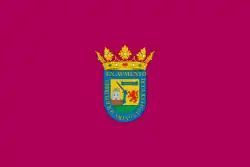





.svg.png.webp)







.svg.png.webp)

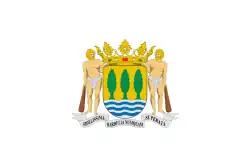

.svg.png.webp)

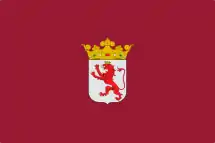














.svg.png.webp)


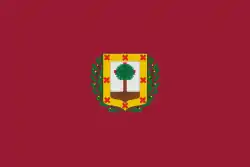
.svg.png.webp)
